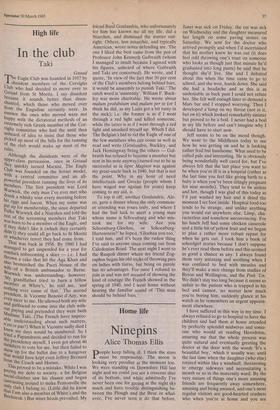High life
In the club
Taki
Gstaad The Eagle Club was founded in 1957 by dissident members of the Corvigha Club who had decided to move over to Gstaad from St Moritz. I say dissident because it sounds better than disen- chanted, which those who moved over from the Engadine certainly were. In essence the ones who moved were not happy with the dictatorial methods of an extremely rich Greek member of the Cor- viglia committee who had the until then unheard of idea to insist that those who Picked up most of the bills for the running Of the club would make up most of the rules.
Although the dissidents were of the upper-class persuasion, once in Gstaad they quickly turned Marxist. The Eagle Club was founded on the Soviet model, With a central committee and an all- Powerful president running the lives of its members. The first president was Lord Warwick, the only man I've ever met who drank a whisky sour every morning before IS eggs and bacon. When my name was Put up for membership, the since departed Fulke Warwick did a Niarchos and told the rest of the screaming members that Taki ■ vas born to be a member of the Eagle, and if. they didn't like it (which they certainly didn't) they could all go back to St Moritz or whichever resort they had come from. That was back in 1958. By 1960 I had Managed to get suspended for a year for condU ct unbecoming a skier — i.e. I had thrown a cake that hit the Aga Khan and a1.s0 besmirched the Pucci blouse of the w_de •of a British ambassador to Berne. ,warwick was understanding, however. MY grandfather fried to burn a fellow Member at White's,' he told me, 'and nothing ever came of that.' The second President, le Vicomte Benoist d'Azy, was even nicer to me. He'allowed both my wife and girlfriend to come into the club with- Zit Paying and pretended they were both ableadame Taki. (The French have impecc- understanding about such matters, nk err ce pas?) When le Vicomte sadly died I t ew my days would be numbered. So I !led a Papandreou and decided to run for the presidency myself. I even got about 40 members to vote for me, but then failed to show up for the ballot due to a hangover that would have kept even Jeffrey Bernard trom the Coach and Horses. This proved to be a mistake. While I was Paying ray debt to society, a fat Belgian social-climber saw his chance and began Canvassing around to make Pentonville the Only club I belong to. (Little did he know that I am also a member of White's and the Beefsteak.) But wiser heads prevailed. My friend Basil Goulandris, who unfortunately for him has known me all my life, did a Niarchos, and dismissed the matter out- right. Others, less autarchic, and typically American, wrote notes defending me. The one I liked the best came from the pen of Professor John Kenneth Galbraith (whom I managed to insult because I agreed with his figures, unheard of where Galbraith and Taki are concerned). He wrote, and I quote, 'In view of the fact that 50 per cent of the Club's members belong behind bars, it would be unseemly to punish Taki.' The catch word is 'unseemly'. William F. Buck- ley was more charitable. He wrote about malum prohibitum and malum per se (or I think he did, as my Latin got a bit rusty in the nick); i.e. the former is as if I went through a red light and killed someone, while the latter is as if I went through a red light and smashed myself up. Which I did. The Belgian's bid to rid the Eagle of one of the few members who can count as well as read and write (Goulandris, Buckley, and Jack Hemingway being the others — Gal- braith has refused to become a member but sent in his note anyway) turned out to be as successful as la ligne Maginot was against my great-uncle back in 1940, but that is not the point. Why in my hour of need intellectuals and Greeks (people whom I have waged war against for years) keep coming to my aid, is.
To top it off; another Goulandris, Ale- co, gave a dinner where the only common- er attending was yours truly, and where I had the bad luck to meet a young man whose name is Schoenburg and who mis- took me for my wife. 'Are you Schoenburg-Glochau, or Schoenburg- Hartenstein?' he lisped. `Glochau you too,' I told him, and it's been the rudest thing I've said to anyone since coming out from Caledonian Road. The next night I went to the Ruspoli dinner where my friend Zog- raphos began his old tricks of throwing pies on ladies with tiaras, but being on parole has its advantages. For once I refused to join in and was not accused of showing the kind of courage the French showed in the spring of 1940, and I went home without hearing the familiar sound of 'This man should be behind bars.'














































 Previous page
Previous page